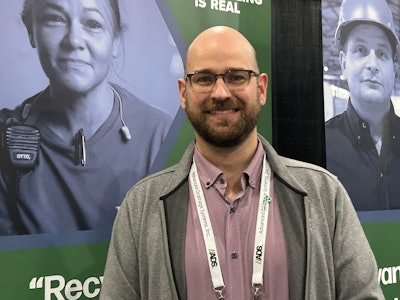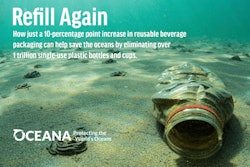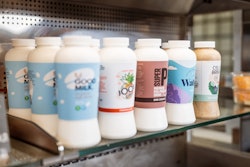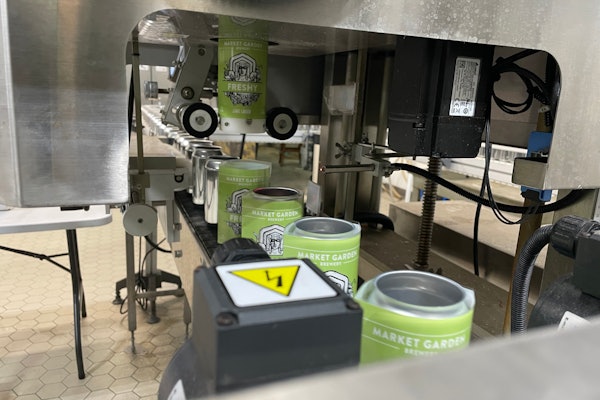Today at the Plastics Industry Association (PLASTICS) booth at the Plastics Recycling Conference in Grapevine, Tex., Patrick Krieger, vice president of sustainability for the association, sat down with Packaging World to share details on PLASTICS’ Recycling is Real campaign and its new Flexible Film Recycling Alliance (FFRA).
Editor’s Note: Launched in fall of 2023, the Recycling is Real advocacy campaign is dedicated to promoting and defending plastic recycling in America. A large component of the campaign is a series of videos of recycling companies telling their stories. FFRA is an industry coalition created to improve the recycling of flexible film products by working to accelerate recycling rates, access, and education.
Packaging World:
Could you share some background on PLASTICS’ Recycling is Real campaign? What drove the project, and what story are you trying to tell?
Patrick Krieger:
The genesis of this campaign is actually something that we’ve heard over and over again from people who ostensibly care about the environment, but interestingly enough are actually pretty critical of recycling—specifically that recycling and plastic recycling is a myth. That’s something we’ve heard over and over again, and it’s just wrong. It’s just inaccurate based on everything that we do in our industry association.
At events like this, we really want to make sure that people see that recycling is real and that it is happening every day, so this campaign is intended to be an opportunity for people to be able to see companies that are actually physically recycling plastics. We know that recycling is a system, it’s not a single act. It’s not putting a bottle in a recycling bin. It requires a wide variety of steps that all have to happen to make sure that product becomes something new at its end of use. And so Recycling is Real is highlighting the companies that are doing that activity.
Just to level set on terminology, when we’re talking about plastics recyclers, do you consider the MRFs [Material Recycling Facilities] the recyclers or the companies that are buying the materials from the MRFs and then processing them into pellets?
So again, recycling is a system, not an act. So everybody is doing something differently. A MRF does sortation. They are separating the wide variety of materials—metals, fiber, glass, plastics—into various bales for subsequent processing. And then you go to plastics recyclers, in our industry, and so yes, those are who we refer to as the recyclers. I think a lot of people do happen to think that most of the magic is happening at the MRF, and it is a very important and very cool step, but it’s not the only thing that’s happening, it’s just one step in the process.
Are most of the Recycling is Real videos are from plastics recyclers?
Yes
Is it the primary role of plastics recyclers to turn the baled plastic waste into recycled resin?
It depends. Once you get to the plastics recycler, there are a wide variety of models. Some recyclers take that plastic and are washing, sorting, and pelletizing it, and then that material is subsequently going to somebody else for compounding, which means that they’re adding additives to it or other things. And then it’s going to a processor converter.
But more and more we’re also seeing processor converters. A really great example is Placon, one of the participants in the [Recycling is Real] campaign. Placon does recycling, and then they use that material to make new products again.
Once the plastic gets past the MRF, there are a lot of different ways that recycling happens. But the MRFs are also very important. In fact, we encourage people to see if they can do a tours of their local MRF. Many MRFs make tours available. It’s a really great way to learn how you can recycle better in your specific community. But not everybody has a plastic recycling facility that they can go see, and that’s why these videos are really useful.
So these videos are consumer facing?
Yes. One of the reasons we’re here at this event is not to convince plastics recyclers that recycling is real, but to tell them to take our videos and share them within their networks because that really helps spread that message within the consumer audience. People believe what people who are close to them say. And so we really want to make sure that we are engaging and encouraging the rest of the industry to talk about how recycling is important and it’s real.
In addition to consumers, we are focusing on policymakers, who are also really important in this process. Sharing these stories with policymakers who are making decisions that are impacting the lives of over a million people in the plastics industry is really important. And when I say policymakers, I’m not just talking about typical policymakers in Congress or in statehouses, but also in boardrooms. We recognize there is a lot of “policy” that gets decided by very large companies, and we want to make sure they understand that their products or the plastic products they use can be recycled and are recycled.
On another note, your organization just announced news of a new initiative, the Flexible Film Recycling Alliance, or FFRA. Can you talk a bit about why that was established and what it involves?
The Flexible Film Recycling Alliance is a program that brings together leaders in the industry who are committed to a healthy flexible film and bag recycling ecosystem. We want to work together to improve things like consumer education; we want to make sure there are tools available for them to know how and where and what to recycle.
We also want to make sure we’re continuing to tell that important story of why we use these things in the first place. I always think that’s really important when people are talking about recycling and solving recycling challenges, because we need to answer the question of why go through all the effort to solve these very difficult challenges? Well, because these products are very important to our daily lives. And so we want to make sure we recognize that and ensure people continue to have access to that by being able to responsibly recycle these things at their end of use.
When you’re talking about flexible film, are you talking just about monolayer polyethylene bags or does that include multi-laminate flexible packaging?
We believe all of them should be recycled, though not necessarily all in the same way. And that means we think there are multiple pathways to recycling. We know many people are driving towards curbside recycling as a way to collect many of these different types of materials, whether they are monolayer PE films or multilayer metallized chip bags, things like that. We want to work on all of them, and we are prioritizing ways to work through the process to make sure all of them are ultimately recycled. That’s our goal. We believe all of them should be recyclable, and that’s what we want to do.
So are you envisioning that multilayer flexible packaging could be handled by chemical recycling? As I understand it, PLASTICS is in favor of chemical recycling, correct?
We think that advanced recycling is a really important tool for us to be able to A.) recycle all of the materials that we have, and B.) meet the commitments that we need to as an industry and as a society on diversion of waste from landfill. It’s a really important tool and very complementary to existing mechanical technologies, and we want to make sure that products make it to the place where it makes the most sense.
I understand that FFRA is putting together a directory. What will that consist of, and who is it for?
The directory is intended to provide consumers information on where they can recycle their flexible film bags at their end of use. It will primarily focus on store drop-off because for most Americans, that’s the way they can currently recycle those. But it’s not going to end there. There’s a reason we don’t call ourselves the Store Directory Recycling Alliance. We know that there are other collection methods, such as community hubs.
We want to make sure that if someone wants to recycle their film products, they have the best information to do that. But again, we know it’s 2024, and that information can’t just live on a website. We want to make sure we can use it in social media or other solutions so the directory and its complementary database are able to be used as widely as possible.
Another thing that’s really important for this directory is that people can trust the data within it. So we’re working to make sure that the data that’s input into the directory is verified. We’re making sure that those materials are actually being recycled once they’re collected. And much like with our Recycling is Real campaign, we hope to use our website to show that actually happening, and telling consumers what happens to their products once they’ve done their part and it’s now on us.
We’re in the process of building this directory from scratch, making sure we’re including all participants within that recycling process, which includes retailers, waste haulers, material recovery facilities, and plastics recyclers. We want to make sure the initiative has everyone involved so that the data is as robust as possible.
That’s quite an undertaking. Are you just starting to collect that data now?
We have started, and we will be rolling this out in phases because you’re right, there’s a lot going on. But the thing is, it’s important, and it’s not like we have all the time in the world. This is an important thing for the industry. It’s something that our partners have recognized, and they are supporting us in, which has been really great to see, to really help accelerate this where we can.
Looking forward to the future of plastics recycling, are you optimistic? Or do you feel frustration that the needle isn’t moving faster?
At the Plastics Industry Association, we’re results oriented. We want to make sure the things we’re doing are impactful and important. And so I hear you about wanting to make sure we’re moving the needle. Our CEO, Matt Seaholm, also talks about motion versus progress, right? Yes, there’s a lot of activity, but ultimately, where are we going?
For me personally, I’m incredibly optimistic about the future. I think there are so many people now who are really recognizing the importance of recycling plastic products at their end of use, whether that’s flexible or rigid, whether that is consumer electronics, whether it’s clothes. We’re seeing more and more people come to us to say, “This is important to us. How do we solve it?"
But it’s really important to recognize that these are systems issues, and they’re incredibly complex, and there can be unintended consequences if we don’t change things thoughtfully. And so that’s why it’s really important that we all collaborate and work together so we don’t implement changes in a way that makes it less economical to recycle or makes it more difficult to recycle something. We want to make sure we’re working in a thoughtful manner, but I recognize that policy, consumer sentiment, brand statements, all of these things are leading to that critical mass that’s going to propel us forward. PW




























